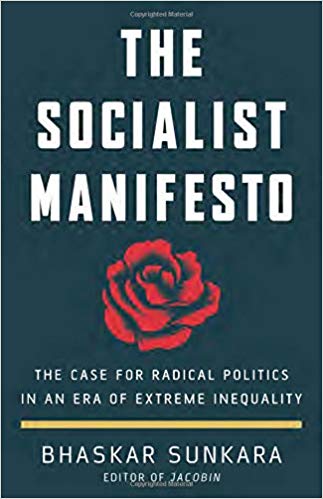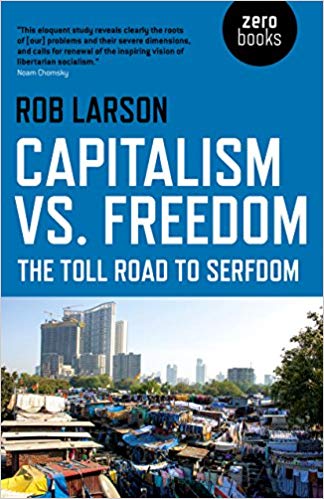Reviews
Radical politics
The Socialist Manifesto. The Case for Radical Politics in an Era of Extreme Inequality. By Bhaskar Sunkara. Verso, 2019.
 Sunkara is the founder of Jacobin, the US left-wing magazine, and a member of the Democratic Socialists of America, an offshoot founded by Michael Harrington of the old Socialist Party of America that, when this broke up in 1973, decided to work within the US Democratic Party. His book sets out to explain what he sees as socialism to American readers who up till recently regarded it as a dirty word.
Sunkara is the founder of Jacobin, the US left-wing magazine, and a member of the Democratic Socialists of America, an offshoot founded by Michael Harrington of the old Socialist Party of America that, when this broke up in 1973, decided to work within the US Democratic Party. His book sets out to explain what he sees as socialism to American readers who up till recently regarded it as a dirty word.
He describes himself as a ‘democratic socialist’ as opposed to a ‘social democrat’, the difference in his mind being that the latter seek to introduce reforms from above while the former want to see them introduced as a result of mass popular pressure. But this is a distinction without a difference. He is, then, a left-wing social democrat. His rather confusing conception of socialism is an economy of worker-run firms producing for the market with a free health service and a basic income scheme.
Despite this, his book makes a good criticism of capitalism and provides a useful history of those who, in the last century, called themselves socialists, the chapter on the German SPD in particular. It could serve as a basic introduction to the background to the debates about the meaning and best way to achieve socialism that we ourselves engage in.
Of course his point of view is not ours, but that of a social democrat who regards himself as a Marxist. He could be worse. He could have been a Trotskyist or some other member of the Russian Revolution re-enactment society. In fact he recognises that it is not possible to establish socialism unless the conditions for it exist, which they didn’t in Russia, China or the other economically backward countries governed at one time by people claiming to be Marxist:
‘The Third World’s experience with socialism vindicates Marx. He argued that a successful socialist economy requires already developed productive forces and that a robust socialist democracy requires a self-organized working class.’
He is aware of the criticism we have always made of the Labour Party and its Social Democratic equivalents abroad as, in discussing the failure of the 1929-31 MacDonald Labour government, he quotes both what we said before (‘No matter how able, how sincere, and how sympathetic the Labour men and women may be who undertake to administer capitalism, capitalism will bring their undertaking to disaster’) and after (‘it is not possible for the Labour Party or any other party to administer capitalism in such a way that the workers’ problems can be solved within the framework of the existing system’).
He seems to take this on board as he writes later on that ‘administering a capitalist state requires maintaining business confidence and corporate profits’ and that ‘Social democracy’s dilemma is impossible to resolve: even when nominally anti-capitalist, it is reliant on the continued profitability of private capitalist firms.’ And in his verdict on European Social Democracy:
‘Even with the more modest ambition of just humanizing capitalism, no national left government in Europe has been able to carry out its program in at least forty years.’
The one example of success, albeit temporary, he gives is Sweden until the 1970s, where the government and the trade unions reached an agreement with the private capitalists, leaving them to pursue profits in return for them handing over a part of these to be used for welfare and other reforms. With the end of the post-war boom in the 1970s, however, this collapsed.
He still thinks the best way to replace capitalism is via the election of a Social Democrat government, backed by a mass movement which, when the government comes up against the economic constraints of the profit system, can pressure it not to retreat (as all such governments have done) but to go on to break with capitalism. As he puts it, ‘we will probably only be driven down the path to socialism by practical necessity, by the day-to-day struggles to preserve and expand reforms.’ This is the old, discredited theory that socialist consciousness will emerge from the pursuit of reforms.
Sunkara quotes Michael Harrington (who wrote a passable book on Socialism himself) as saying that socialists had to ‘walk a perilous tightrope’ between being ‘true to the socialist vision of a new society’ and ‘bringing ‘that vision into contact with the actual movement fighting not to transform the system, but to gain some little increment of dignity or even just a piece of bread’. True, socialists are on such a tightrope and cannot be indifferent to the sufferings of workers under capitalism. However, history, specifically that of the political perspective Sunkara wants to revive, shows that to pursue reforms leads to falling off into the bog of reformism and forgetting all about socialism.
ALB
Negative for Freedom
Rob Larson: Capitalism vs. Freedom. Zero Books £14.99.
There is a standard distinction between two kinds of freedom. Negative  freedom (‘freedom from’) involves a person being able to act without others having the power to coerce them, while positive freedom (‘freedom to’) is about what a person is actually free to do. Here, confronting supporters of capitalism (especially Milton Friedman and Friedrich Hayek) who see free-market capitalism as the best guarantee of freedom, in particular the negative type, Rob Larson claims that capitalism cannot deliver either kind of freedom. His arguments and examples apply particularly to the US, but have wider validity. His previous book Bleakonomics was reviewed in the March 2013 Socialist Standard.
freedom (‘freedom from’) involves a person being able to act without others having the power to coerce them, while positive freedom (‘freedom to’) is about what a person is actually free to do. Here, confronting supporters of capitalism (especially Milton Friedman and Friedrich Hayek) who see free-market capitalism as the best guarantee of freedom, in particular the negative type, Rob Larson claims that capitalism cannot deliver either kind of freedom. His arguments and examples apply particularly to the US, but have wider validity. His previous book Bleakonomics was reviewed in the March 2013 Socialist Standard.
He begins by considering freedom to buy and to work, with people supposedly free to choose what job to do and which goods and services to purchase. But this is really very limited, since in practice concentration of power makes markets gradually less competitive over time. The US has two main ‘merchant monopolists’, Amazon and Wal-Mart. Amazon, for instance, extracted better terms from publishers by not recommending their books and so cutting their sales. Technology giants conspired to keep down the wages of software engineers. The class division of capitalism is an impediment to real freedom, as the employing class have far more power and freedom than the workers.
Larson then moves on to looking at freedom of information, where he has little difficulty in showing that powerful oligopolies dominate the media, and that advertising is a form of brainwashing that has enormous influence on people’s behaviour. With regard to political freedom, he notes how wealthy most of those who framed the US constitution were, and how dependent political campaigning is on big donations, from such as the Koch brothers.
A more interesting chapter examines ‘power over future generations’, how a terrible legacy is being left: species extinction, global warming, massive pollution. Later generations may lack access to many things taken for granted today, such as adequate fresh air and water, and the benefits of biodiversity. The ability to enjoy nature is a clear example of a positive freedom that may be drastically restricted in future. By the end of this century, for instance, it may well be impossible to live outdoors in summer in much of the Middle East.
In his final chapter, Larson observes correctly that many political parties that call themselves ‘socialist’ simply stand for mild reforms of capitalism. He criticises Lenin for his authoritarianism, and admiringly quotes Anton Pannekoek in support of economic democracy. But his own ideas for a future society are not very clearly explained. He advocates ‘workforce control over production and investment’, with production units interacting by means of ‘free association’. He does not mention the abolition of wage labour, so it can be assumed that there would still be wages and prices in this supposed ‘participatory socialism’.
PB
Video Review
Labour’s plans for capitalism
For the 2019 local elections, the Labour Party released a video claiming ‘It’s just common sense.’ The video was entitled ‘Five people verses a billionaire’ (see: https://bit.ly/2HXuM9U ). Shares on social media proclaimed the video to be a better education in economics than most university classes.
The video depicts the difference between ‘giving’ money to ordinary people, via a pay-rise, a pension, disability benefits or a small business loan with giving the equivalent amount to a billionaire in the form of a tax cut.
The video then depicts all the five people spending their extra money, generating more business, economic growth and higher tax returns in their area: essentially, making the argument for a multiplier effect, whereby increasing consumer resources generates more wealth than would be spent in pay pensions and benefits.
The video asks the billionaire what they did with their money, and tellingly, he airily declares he forgot about it, but will probably send it to the Cayman Islands with the rest.
There are many problems with this short video. Firstly, the idea that economic growth is driven simply by having more commodity exchanges on the market. Circulating the wealth faster and faster does not create new wealth. Stimulating ‘demand’ by making more money available only generates growth if more wealth is produced to increase supply. Capitalist firms could just raise prices to capture more of this new demand, rather than increase production.
It neglects that the money to pay pay-rises, pensions and benefits has to come from somewhere. Of course, many Corbynistas argue for Modern Monetary Theory (MMT) which says that money can just be created out of thin air (much like the old social credit fantasists of the 1930s). Money not backed by real wealth, though, is just tokens. Government must lay a claim to a share of the wealth that has already been produced in order to have tax money to spend.
A government can theoretically tax any existing wealth: all it needs to do is identify the source of wealth and apply force to claim control of it. The only limit to expropriation is the need for political support to be maintained for the government and the operational efficiency of the laws and bureaucracy of the nation.
Expropriation of wealth and monetising it can increase the value realised in an economy, in the form of windfall profits. A modern government could raid hidden pots of wealth, but this would take money out of the capital cycle which would disrupt the economy, and, at the least, be unpopular (if not actively counter-productive). Governments in a capitalist economy can only tax new wealth, to take a share of the profits generated, if they want to be sustainable. That is, they can only tax within the limits of profitability.
If the tax rates are too high, then investors will be deterred from turning their wealth into capital, and an economic crisis would ensue. The threat of a capital strike is an effective tool for the masters in the class war, and one that is largely hidden as a ‘natural’ fact, rather than a social act of self-interest. Labour’s video fails to expose this, instead simply conveying that billionaires naturally hoard wealth, rather than dutifully spending it.
Any spending done with tax will return less in new profits than the sum extracted from profits through taxation (because any of that spending will have to give a share to wages or paying for capital invested already in goods and services).
The government could instead borrow money from the wealthy, this, however, acts in much the same way as taxation, directing wealth away from the capital investment cycle, and reducing the production of new output. It further adds to the capitalists’ control over the economy, since the state is now committed to paying them back, and it can only carry out policies that will securely honour its debts.
In the specific instance of where the capitalist (the billionaire) would prefer to export their wealth rather than spend it in the country, taking this money and spending it would increase the sum of domestic demand. However, the reason the billionaire would be declining to invest and instead export their wealth is because there isn’t enough profit in the market to induce them to invest in new production. Taxing the profits of the billionaire reduces rather than increases their incentive to invest.
This is just a return to the Keynesian fantasy that the economy can be ‘pump-primed’ by taking idle wealth that is uninvested, and turning it into consumer demand. Even worse, it is the mirror image of the Tory line that a ‘well-managed economy is vital to the delivery of public services’ (i.e. that stringent government restraint to allow firms to grow leads to tax revenue and money to spend on services).
In both cases, human need is subsumed to the need to successfully exchange commodities in a market place. They both rely on a systemic logic that puts the owners of commodities in first place within the economy, and makes everyone else dependent upon fulfilling their interests. Put another way, for all the radicals proclaiming Labour finally coming out in favour of the ‘multiplier effect’, this video radically disarms the electorate, and the working class.
The knowledge that wealth is produced by our labour, and the interests of the property owners hinder it being put to the service of our needs leads to a very different set of conclusions: that we need to take ownership of the productive wealth for ourselves, and bypass the market entirely.
The propaganda of the Labour Party under Corbyn is as much a barrier to spreading the message needed for working class self-emancipation as it ever was under Blair. The Labour Party, far from progressing the interests of the working class, is about trying to use state power to make the market work in favour of people, and that is like trying to put a mad bear to work in a shop. 
PIK SMEET
